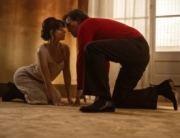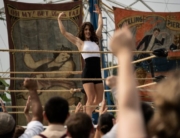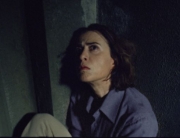Cynthia Nixon stars as the great American poet Emily Dickinson. Written and directed by Terence Davies (The Deep Blue Sea), this biopic delves into the poet’s life of self-restraint. A Quiet Passion is not just a character study but a look at a bygone era. While Dickinson’s tortured existence was mostly by her own doing, she was nevertheless a victim of her time.
Davies’s film does a lot of world-building in the first half hour or so. It takes a while to adjust to the nature of how people lived in the mid-1800s, as opposed to today’s text-dependent world. People spent more time together back then; they talked a lot more. And because they spent so much time talking, they were much better conversationalists. Davies’s script fires off some wonderfully clever witticisms that will have literate audiences relishing the effort. Some choice lines: “The best compliments are dubious.” “You soul is no laughing matter.” “I know, father. That is why I guard its independence so meticulously.”
Equally, people spent more long stretches with absolutely nothing to do but be in their own heads. There’s an especially effective panorama shot of the Dickinson parlor on an evening when the whole family is present, each doing his/her own thing in absolute silence. whether it be writing a letter, simply staring into the fire or, who knows, feeling the seconds of one’s life pass. Even for a wealthy family, this is a dreary existence.
Religious conviction looms over every aspect of their lives. Emily and her sister cannot offer their guests coffee without mentioning God. Emily herself seems to waver between pious devotion and living as a free spirit. Many people spend their entire lives trying to figure out what God wants them to do, and in this film, that is Dickinson’s fatal flaw. While she waits for God’s calling, life passes her by.
Those familiar with the poet will know that she was reclusive, never leaving the grounds of her home for the last couple of decades of her life. What is surprising is how family-oriented she was. At the Dickinson estate also lived her sister, Vinnie (Jennifer Ehle from Little Men), her brother, Austin (Duncan Duff), and her mother (Joanna Bacon), who was depressed to the point of near-paralysis. All were provided for by patriarch Edward Dickinson (an aristocratic turn by Keith Carradine).
Dickinson’s closest relationship was with her sister. While Vinnie was not as intellectual as Emily, this was to her benefit as Emily was clearly obsessed with the state of her soul. When Emily is at her worst, Vinnie is the one who can talk sense to her. Well, relatively.
The Dickinson sisters’ friend Vryling Buffam (Catherine Bailey) has the juiciest role, a modern woman spouting off Oscar Wilde–ian turns of phrases. She dazzles the sisters as well as viewers, so much they will ache for her whenever she’s not on screen. It’s a shame she exits the film way too early and we’re left with dreary Emily.
The film’s final conflict comes about in the fifth or quite possibly 17th act that seems so out of place. It is inconsequential, not to mention that it has very little to do with anything that has come before. At this point, it becomes clear that Davies feels betrothed to his intention of telling Dickinson’s whole life story, no matter whether it trails at the end.

















Leave A Comment